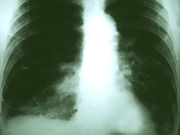Findings in patients with advanced NSCLC with PD-L1 expression on at least 50 percent of tumor cells
TUESDAY, Oct. 11, 2016 (HealthDay News) — Pembrolizumab is associated with longer progression-free and overall survival for patients with non-small-cell lung cancer (NSCLC) with programmed death ligand 1 (PD-L1) expression on at least 50 percent of tumor cells, according to a study published online Oct. 9 in the New England Journal of Medicine. The research was published to coincide with the annual European Society of Medical Oncology Congress, held from Oct. 7 to 11 in Copenhagen, Denmark.
Martin Reck, M.D., Ph.D., from the Lung Clinic Grosshansdorf in Germany, and colleagues conducted a phase 3 trial involving 305 patients who had previously untreated advanced NSCLC with PD-L1 expression on at least 50 percent of tumor cells. Patients were randomized to receive either pembrolizumab or platinum-based chemotherapy.
The researchers found that median progression-free survival was 10.3 and 6.0 months in the pembrolizumab and chemotherapy groups, respectively (hazard ratio for disease progression or death, 0.50). At six months, the estimated rate of overall survival was 80.2 and 72.4 percent, respectively, in the pembrolizumab and chemotherapy groups (hazard ratio for death, 0.60). The pembrolizumab group had higher response rate (44.8 versus 27.8 percent), as well as longer median duration of response and less frequent treatment-related adverse events of any grade.
“In patients with advanced NSCLC and PD-L1 expression on at least 50 percent of tumor cells, pembrolizumab was associated with significantly longer progression-free and overall survival and with fewer adverse events than was platinum-based chemotherapy,” the authors write.
The study was funded by Merck, the manufacturer of pembrolizumab.
Copyright © 2016 HealthDay. All rights reserved.








